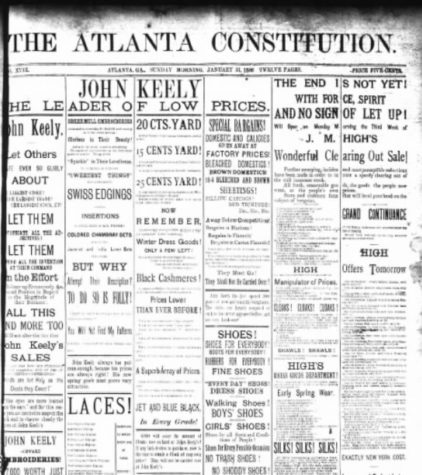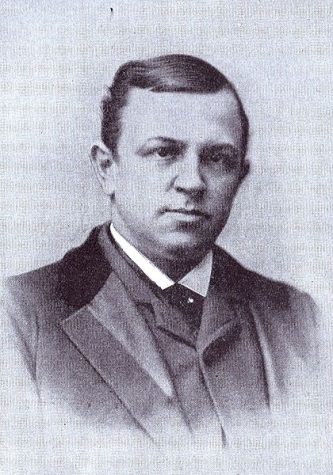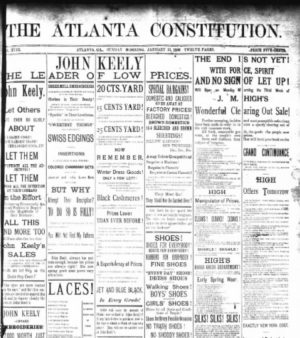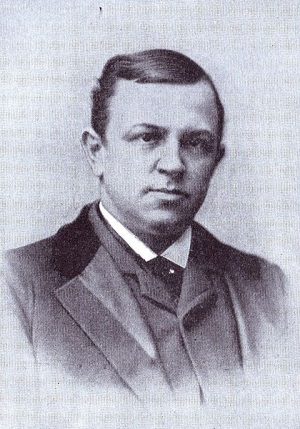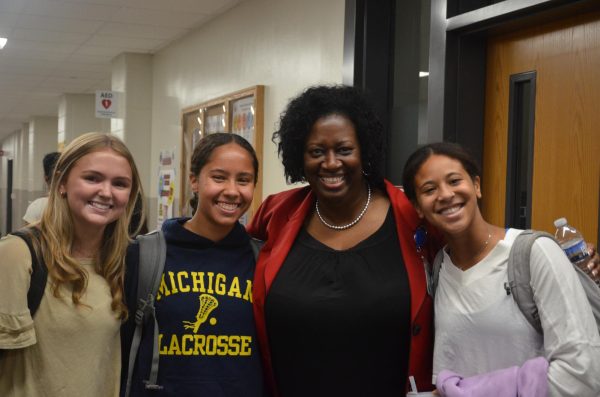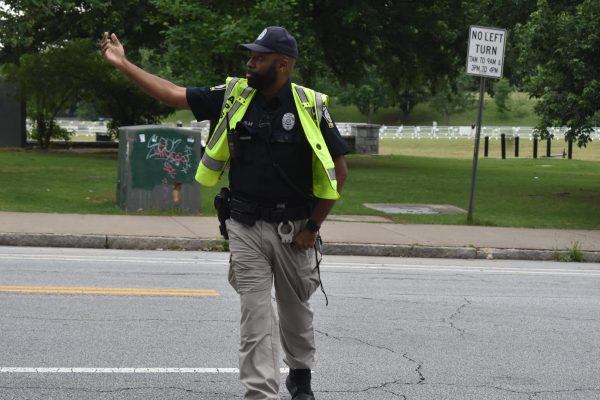Understanding Henry Grady’s New South: Q&A with Jamie Bircoll
Jamie Bircoll is an incoming lawyer at Milbank LLP in New York City. As an undergraduate history major at the University of Michigan, he wrote his thesis, ‘The Shadow of that Memory which I Honor’: Politics and Identity in Henry Grady’s New South Vision, which explores the rise of Henry Grady’s New South movement and the underlying racial hierarchy central to its success. He is from Atlanta, GA.
August 20, 2020
Jamie Bircoll is an incoming lawyer at Milbank LLP in New York City. As an undergraduate history major at the University of Michigan, he wrote his thesis, ‘The Shadow of that Memory which I Honor’: Politics and Identity in Henry Grady’s New South Vision, which explores the rise of Henry Grady’s New South movement and the underlying racial hierarchy central to its success. He is from Atlanta, GA. As part of the coverage of the conversation regarding changing the name of Henry W. Grady High School, the Southerner interviewed experts on Henry Grady.
Who was Henry Grady?
[Henry Grady] is the ultimate son of the South. He’s born in Athens, to a family that owns slaves. As a boy, he is in Athens and he’s helping out at the Confederate field hospitals…this is what really frames who he becomes…When he grows up, he’s this great orator. He’s a thinker. He’s very intelligent. He is very politically perceptive, and he’s very witty. He becomes this very prominent spokesman of the South… He is the stepping stone between the Reconstruction Era of the U.S. and the Jim Crow era. During Reconstruction, there seems to be this moment where the Black people of the U.S., the freed slaves, are finally going to have the same political and social rights as white people. That all comes to an end in the late 1870s, and the 1890s, all of a sudden, there are no rights. Jim Crow takes hold, and Henry Grady’s sort of right in the middle. He is the spokesman of the New South…the New South is really this bridge. It eliminates the loss of political and social freedoms from the Jim Crow era and sort of marries that with more economic development, economic prosperity for all people in a racially-segregated society, but not an oppressive society. Henry Grady is this bridge, and he really, I think, sets the stage for the modern American South…He’s really a character of profound importance, but a lot of contradiction at the same time.
You said Grady functioned as a bridge during this transition period. Were his political ideas/opinions/visions progressive for his time?
I think they were progressive in the sense that…in the South, a big response to Reconstruction was to suppress the Republican, not necessarily the Black, but the Republican vote. And to do it with threats, sometimes violence, sometimes with ostracizing Republican voters. And so Grady presented an opportunity. He says, “… you guys should come invest in the South, and you should remake the South in a kind of image of the North economically. In this image, it’s no longer the South of old. We are not about suppressing the vote. This is going to be a place of equal political rights.”… People in the North are like, “Oh, yeah, it can be.” And so there’s no longer this fear of suppression of the Republican vote. And there’s an economic opportunity to make a lot of money.
Are they progressive in the way we use progressive today? I don’t know and maybe I don’t think so. But if he was not the only voice, he was certainly one of the most prominent to say, “Hey, there’s a new way we can do this, and that way is through reconciliation,”…But also, and this was the kicker, it is also through leaving the Southern political system alone and let the South run its political system and ultimately, you got to let the South dictate how it’s going to organize society based on race. And that was the big compromise.
Grady was the leader of the New South. Can you talk a little bit about who benefited from this society?
Northern Republicans were huge beneficiaries. They were able to make their money through investments into a new, previously not industrialized, economy. Atlanta, in particular, is one of the places that really benefited as a result. There were new railroads, new industries all coming in out of this era, and it’s due in large part to the capital from the North…White southerners also benefited greatly from this economic investment and new businesses came to light. The railway comes through, which is huge…A lot of cities were rebuilt, but this is really a turning point, where you really see the beginning of the modern cities of the South.
The people who get left behind are Black southerners. Grady’s New South movement didn’t argue for the suppression of political rights, but he was like the South is a place where Black southerners should be able to exercise their vote. But he did say the South also needs to be a place of racial separation. He was using the phrase “separate but equal” 15 years before Plessy v. Ferguson did, at least. He said…Whites and Blacks are supposed to be separate, they’re happier, separate…and this is the way our society is going to thrive. So what you ultimately see happen is the South starts to get more aggressive…And so the New South visions sort of starts to collapse because you no longer have political equality and legal equality. As soon as you can legally discriminate against people, then there is no equality. And that’s when you start to see the fall into the Jim Crow era. So the New South movement really is the beginning of this really great collapse of equality in the South. Black southerners are the ultimate losers.
You say that Grady is spreading the message that Black people should not be actively oppressed but at the same time, Black southerners were the people that were left behind in the construction of the New South. Generally, how did Black southerners during his time view Henry Grady?
I can’t speak to what the prototypical Black southerner thought of Henry Grady. I can tell you that there were a series of articles published…There’s a Black reporter, whom I believe was from the west, who followed Henry Grady on a tour…and he wrote a series of articles on him and his experience traveling with Grady and that was a very positive image. He characterizes Grady as this really gentlemanly, kind and respectful person. I get the sense that if these articles about Grady from the time are to be believed, and they probably are, to some extent, he’s a really real persuasive, well-spoken individual. You don’t get the sense that he treats anybody with disrespect. He’s a very well-liked person, that’s part of why he is so popular in the North as well as the South. What you just don’t get a lot of in the newspapers are the perspectives from Black people. So it’s really hard to know how he is viewed from the eyes of a Black southerner in the 1880s.
But it is just the fact that, regardless of that, Henry Grady, he was a fierce proponent of “separate but equal.” And you know, I’m sure there are people who fall, who fell on all sides of whether that was the right or wrong policy in the 1880s…But again, I just couldn’t tell you.
In your thesis, you talk about how in the late 19th century, there was a period of uncertainty for the future of race relations because 19th-century manifestations of white supremacy were different from past oppression. What were the differences?
What is so interesting to a lot of historians regarding this post-Reconstruction period is that Jim Crow as a system of racial oppression did not have to be the system that replaced slavery: there was a path towards racial equality. And many Republican politicians advocated for that path, just as fiercely as other politicians fought against it. This is what I mean when I refer to the existence of uncertainty – it was not clear whether the radical Republican vision of full equality or the Southern Democratic vision of inequality (whether politically or physically, by the KKK, for example) would succeed.
Additionally, you talked about how this uncertainty was “central to Grady’s New South vision”. Could you explain how this uncertainty worked to the advantage of Grady and his goals?
Grady leaned into this uncertainty by crafting his own vision for the New South. His vision never called for the reintroduction of the old racial hierarchy of slavery, but a new racial hierarchy, one rooted in political equality, but the deprivation of, what Grady called, “social equality” through separate but equal; importantly, it specifically discouraged violence against Republicans. And this was the heart of the New South as a political compromise and why it was so appealing to the parties: northern Republicans could ensure southern Republicans would not be impeded at the ballot box, southern Whites could retain social racial superiority, and both parties got rich. Everybody won, except, of course southern Blacks (and also farmers).
This is why it’s so important to talk about the New South for what it really is: a form of racial control. Yes, economic development was one result, but that was only half the equation. The other half – separate but equal, white supremacy over “social equality” – served as a stepping stone to full, lawful inequality in Jim Crow.
Reading your thesis and other historical accounts, a common theme is that Grady worked to appeal to lots of different parties during this time and had a balancing act going on between the messages he was sending to Northerners and those he was sending to Southerners. How did this “balancing act” influence the speeches he gave, the articles he reported and wrote?
You definitely see his perspective or what he highlights really tends to change depending on whom he’s talking to. So in 1886, he gives his most famous speech in New York…I’m pretty sure he doesn’t mention race at all…He does mention in his speech to the North that the South is nothing for which it needs to apologize…There was this fear [in the South] that so much was going to change and Grady really assuages that by talking about how this new society is going to create a lot of positive change. It’s going to bring a lot of money into the South, but also, it’s going to let the South really dictate how it’s going to organize itself racially. So that’s when you start to see the racial context really come in.
In the 1870s…there’s physical violence as a form of racial dominance. Grady is really saying, “it doesn’t have to look like that here. We can be civil, but also retain political power or, you know, our racial supremacy, over Black southerners.” And so that’s when you start to see like, the racial language really starting to come in… as when he is saying, there will be positives there, there’ll be new money, new capital that’s brought into the region, but also, you know, we can maintain our racial superiority, through separate but equal without suppressing the Republican vote without suppressing political rights, that this is the natural order of things. It’s a non-violent order. But that this is the way it’s supposed to be. And so that’s where it really gets highlighted in the South, and you don’t really see that as much in the North…In the South, In Grady’s mind, everyone is politically and legally equal, and we’re just gonna stay apart from each other. But, lawmakers are repealing anti-discrimination laws and tearing down those political and legal safeguards. And in the North, you get the sort of response that is like, “That was not the deal. You’re repressing the Republican vote by suppressing Black people’s votes. Grady never had a response to that. He was just giving the same answers. And that’s when you start to start to see the whole thing fall apart. And you see the rise of Jim Crow and then ultimately Grady dies.
According to your thesis, the message that Grady was sending to the Northerners was that the South was a place where Black people had an infinite opportunity, but the message he was sending to White southerners was that they could continue to dictate their society by Old South values and the supremacy of the White race. Which of these messages was closer to the reality of the South?
There is a total split among historians as to what was actually going on…There’s a scholar named Joel Williamson. He has a piece called, “The Separation of the Races.” He has a theory called the “dual chromatic order” which basically this is what Grady was saying, and he suggested that Blacks and Whites, and he [Williamson] looks particularly at South Carolina, took like a conscious social separation of the races, but that there was no distinction in terms of privileges in public spaces…You do run the spectrum. Some [scholars] will say it wasn’t that at all. It was like a very clear suppression of Black southerners in terms of their privileges and public. Others say it was equal, and there was actually no separation. So, it honestly depends where you look. A lot of these works have case studies in particular places and so each of those places will sort of give you a different result. There is a total split across the board.
In your thesis, you talk about how, during Grady’s time, there was this tension between economic aspirations and racial disunity, and it led to much political divisiveness and a lot of problems for the South. With that in mind, how do we balance Grady’s economic achievements and his white supremacy in this already divisive conversation over the name change?
Until recently, we’ve really looked at the past with rose-tinted glasses…I would say there are probably very few people who had a stronger hand than Henry Grady in how Atlanta, itself, was made in the 20th century…He was the single loudest person bringing money into Atlanta to make it this booming southern economy and intimately tied to those reasons, are his idea of racial separation and “separate but equal” and white supremacy. So, when we look at Henry Grady, we need to consider all of that. I think, we as a society, will be doing ourselves a disservice to look back on her past with blinders in order to make ourselves feel better because Henry Grady’s dead. He doesn’t care. When we name things after Henry Grady, we’re honoring Henry, and if we choose to ignore the entirety of this person, then we’re dishonoring ourselves. There’s a way to acknowledge Henry Grady, without necessarily glorifying him…Atlanta, as it exists today, is in a sense, honors Henry Grady by simply existing and being like this great big city in the south that he certainly envisioned it to be.
I don’t think we’re disrespecting Henry Grady by choosing or not choosing to have public institutions named after him… Personally, I’m a white man…It’s not my call to make, but I do think … it’s important to acknowledge the whole picture, and it’s really hard to name like a school or hospital after someone and somehow attribute, like the full context of that person in the name alone…The most important thing is to acknowledge that, and I think we finally are, that Henry Grady did so much for our city, and he was also incredibly racist. And, a lot of what he did for our city was founded on racism. So that’s really what we have to have to reconcile with.



